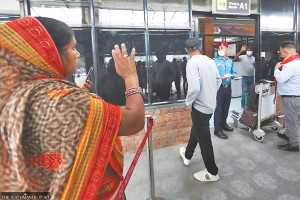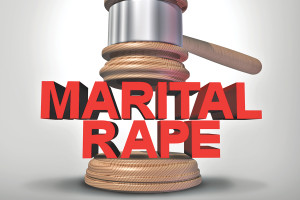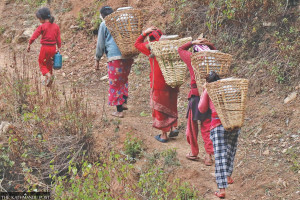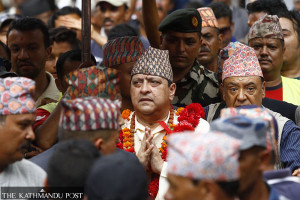 30.12°C Kathmandu
30.12°C KathmanduOpinion
Geostrategic disaster
If we are to rescue the constitution, the government must reach a compromise with the Madhesi people
Nepal is facing a humanitarian crisis. The earthquake victims are braving a harsh winter because the government has been unable to even finalise the bill on the formation of Reconstruction Authority. And now, the country has run out of medicine and essential supplies.
In the last 15 years, Nepal has seen several games of political brinksmanship. In all those games it is Nepal and the Nepali people that have always lost. A game of brinksmanship is one where political actors invite dangerous consequences to have their way. By this account, both PM KP Sharma Oli and India are players nonpareil. Unfortunately, such games are usually won by those who are least sensitive to humanitarian crisis and people’s lives.
Oli’s way out
KP Oli’s strategy is to just remain the prime minister and wait for India and the Madhesis to relent. He has the support of China, and if he can convince the international community that India is indeed imposing a blockade, and that the demands of the Madhes are undemocratic, then he might perhaps have his way. However, it may not be as simple as that. PM Oli has remarked that the Madhesi movement does not have the support of the Madhesi people and that it is fuelled solely by India.
Despite what PM Oli believes in, the Madhes movement has developed a completely different dynamics because of the state’s human rights abuses. In Tikapur, for example, the Tharus need permission from the Chief District Officer to even celebrate their festivals. As some of their leaders indicated, the Tharus are already boycotting shops of the hill people and are mulling non-cooperation as a strategy. This effectively means that Tharus will not work in the lands and houses of the hill people.
The government insists that India is fuelling the Madhes movement by blocking oil supplies. Madhesis, on the contrary, claim that Oli’s verbal abuse has instead fuelled the movement so much that even children are inspired to take part in it.
The government has not been able to convince the people that the Madhes movement is not the real problem. The government is not providing journalists with the day-to-day details of the blockade and its initiatives to resolve the current impasse. Information only trickles down about certain incidents, like an Indian Oil Corporation depot refusing to sell fuel to the Nepal Oil Coorporation. If the government provides consistent and credible evidence to the media about Indian actions that support the ‘blockade’ claim, then it would help inform the public and the international community.
There are other factors undermining Oli’s legitimacy. Prevalent extractive practices and the gap between what the leaders say and what they do is undermining the moral strength of the ‘nationalism’ being promoted by the government. For example, Pushpa Kamal Dahal has lost the trust and credibility of the people because they really want him to start riding a bicycle.
The failure to take the Nepali Congress (NC) on board has strengthened critical voices that neither trust PM Oli nor UML’s politics. And most importantly, India appears to be driving at a regime change in Nepal. Whenever India has resorted to such political brinksmanship, it has relented only after a regime change.
The role of geo-strategy
The role of India and its motivation in reacting the way it did to Nepal’s new constitution has confused Nepali people the most. India’s late insistence on accommodating the Madhesis and its extreme positioning came as a surprise, mostly to PM Oli himself and the Congress.
India’s real reasons behind the ‘blockade’ are not very clear. What is clear is that India was not happy with the way the constitution bypassed the Madhesi parties, and is strongly backing the Madhesi Movement against the mainstream political establishment in Kathmandu led by PM Oli and Dahal.
Some journalists have suggested, though without evidence, that India wanted to do away with secularism. This idea, however, does not sound convincing. But it does resonate with what happened in September. The mainstream political parties were able to generate fear about India’s ‘intentions’ and expedite the drafting process.
During the final moments of the constitution-drafting process, Oli and Sushil Koirala sold the idea to their constituency that if the constitution was not drafted that week, India would not allow a new constitution to be drafted at all. The argument being that India would use the Madhesis to ‘split’ the nation, weaken sovereignty, and restore Nepal’s identity as a Hindu kingdom.
Many leaders in the NC, even now, are convinced of India’s evilness but are unable to express it openly. The mainstream political parties have been able to play on people’s fear of India to have their way in politics.
However, geo-strategy does seem to have a significant role in the current unfolding of events because Nepal’s internal polarisation reflects the opposing roles of China and India. While the hill community is becoming more anti-Indian, the Madhesi community is becoming anti-Chinese.
India’s relation with China has hardened in the recent days. One example is the joint statement released by India and Philippines during the Indian Foreign Minister’s visit, which renamed the South China Sea as the West Philippines Sea. Another example is the vigilance related to talks about China’s military base in Djibouti, which seeks to lessen US influence in the area.
India is particularly wary about China’s increasing economic and security ties with Nepal. India’s Air Chief Marshall Arup Raha’s statement released on Monday says that India’s foreign and defence policies are being designed to contain China’s growing influence in South Asia. Second, he said that increasing economic and military ties with Nepal were part of “strategic moves by China to contain India.” Third, he said Maoist movement in India was its biggest internal security threat.
Various reports suggest that Dahal and Sher Bahadur Deuba had assured India during their visit in June that they would accommodate the Madhesis and produce a consensus document. According to Economic Times, India intensified its diplomatic efforts in September and October to ensure that the US and the European Union were close to the Indian position.
Last week, China’s Foreign Ministry said that Nepal should try to resolve its internal issue without external interference. It said that China was ready to consult with India to sort out the current impasse.
Accountable politics
The current problems were generated by the Congress and its leadership. NC refused to heed India’s warnings delivered by its Foreign Secretary before the promulgation of the constitution. However, the NC took a 180-degree turn after the promulgation of the constitution and proposed an amendment to accommodate the Madhesi demands. The NC, therefore, must take accountability for its actions, and cannot completely shift the blame on the shoulders of PM Oli.
At the same time, the government has no other option than to manage the grievances of the Madhesi people. KP Oli became the prime minister by promising to deliver political stability and prosperity. However, his tenure has done just the opposite and it could have long-term consequences.
If we are to rescue the constitution, the government must reach a compromise with the Madhesi people. If the Oli government and India continue on their current trajectory, Nepal’s humanitarian and political situation will worsen and pave the way for international intervention.





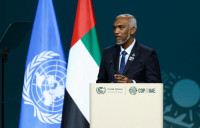




.jpg&w=300&height=200)
